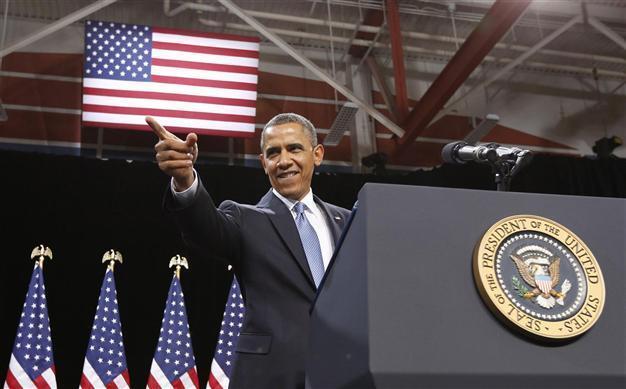Obama: 'Genuine desire' for immigration overhaul
WASHINGTON - The Associated Press

U.S. President Barack Obama arrives on stage to deliver remarks on immigration reform at Del Sol High School in Las Vegas. REUTERS photo.
President Barack Obama on Tuesday praised bipartisan efforts to overhaul the nation’s immigration laws, welcoming "a genuine desire" to tackle a famously snarled system that has been stalled for almost two decades.
At a campaign-style rally in Las Vegas, Obama sought to win public support for changes that would give an estimated 11 million illegal immigrants a pathway to citizenship while tightening border security.
"The differences are dwindling ... a broad consensus is emerging," Obama said of the Democrats and Republicans who are often bitterly at odds. "The time has come for common sense, comprehensive immigration reform." He called the existing system "broken for way too long.’
Immigration advocates said they expected the president’s proposals to be more progressive than those featured in a bipartisan Senate plan announced Monday, including a faster pathway to citizenship.
The simultaneous immigration campaigns come in the wake of the November presidential election, where Obama won more than 70 percent of the Hispanic vote in a defeat of Republican rival Mitt Romney, who famously urged illegal immigrants to "self-deport." Republican lawmakers who had previously opposed immigration reform were forced to reconsider it and rebuild the party’s reputation among Hispanics, an increasingly powerful political force.
With the Republicans’ turnaround, immigration has surprisingly emerged as the rare issue with at least some kind of bipartisan support in a deeply divided Congress, where gun control and tackling the massive deficit face far bigger fights ahead.
'Yes, they broke the rules, but...'Still, passage of emotionally charged immigration legislation by the Democratic-controlled Senate is far from assured, and the House of Representatives is dominated by conservative Republicans who have shown little interest in immigration overhaul. The Republican base opposes anything that might resemble an amnesty for illegal immigrants.
"Yes, they broke the rules," Obama said Tuesday of those who illegally entered the U.S. "But these 11 million men and women are now here. ... An overwhelming number of these individuals are not looking for any trouble."
Sen. John McCain, the former Republican presidential candidate who lost to Obama in 2008, said Monday that members of his party should realize that supporting immigration legislation could boost Republican prospects in future elections.
"The Republican Party is losing the support of our Hispanic citizens. And we realize that there are many issues on which we think we are in agreement with our Hispanic citizens, but this is a pre-eminent issue with those citizens," McCain said.
With a re-elected Obama pledging his commitment, the bipartisan group of senators on Monday argued that the chances for approval of immigration legislation are much better this year.
Sen. Charles Schumer, a New York Democrat, argued that polls show more support than ever for immigration changes and political risk in opposing it.
Most of Obama’s recommendations are not new. He outlined an immigration blueprint in May 2011 but exerted little political capital to get it passed by Congress, to the disappointment of many Hispanics.
His original plan centered on four key areas: a pathway to citizenship for the 11 million illegal immigrants in the U.S., improved border security, an overhaul of the legal immigration system and making it easier for businesses to verify the legal status of workers.
Administration officials said they were encouraged to see the Senate backing the same broad principles. In part because of the fast action on Capitol Hill, Obama does not plan to send lawmakers formal immigration legislation.
However, officials said the White House does have legislation drafted and could fall back on it should the Senate process stall. The officials spoke on the condition of anonymity in order to discuss internal strategy.
Obama’s previous proposals for creating a pathway to citizenship required those already in the U.S. illegally to register with the government and submit to security checks; pay registration fees, a series of fines and back taxes; and learn English. After eight years, individuals would be allowed to become legal permanent residents and could eventually become citizens five years later.
The Senate group’s pathway to citizenship for illegal immigrants already in the U.S. would be contingent upon securing the border and improving tracking of people in the U.S. on visas. Linking citizenship to border security could become a sticking point between the White House and lawmakers.
The Senate framework would also require those here illegally to pass background checks and pay fines and taxes in order to qualify for a "probationary legal status" that would allow them to live and work here - but not qualify for federal benefits - before being able to apply for permanent residency, a critical step toward citizenship. Once they are allowed to apply they would do so behind everyone else already waiting for a green card within the current immigration system.
Gay and lesbian advocates were also expecting Obama’s proposals to include recognition of same-sex couples where one partner is a U.S. citizen and another is not.
McCain called the issue a "red flag" in an interview Tuesday on CBS, and he said he didn’t think the issue was of "paramount importance at this time."
